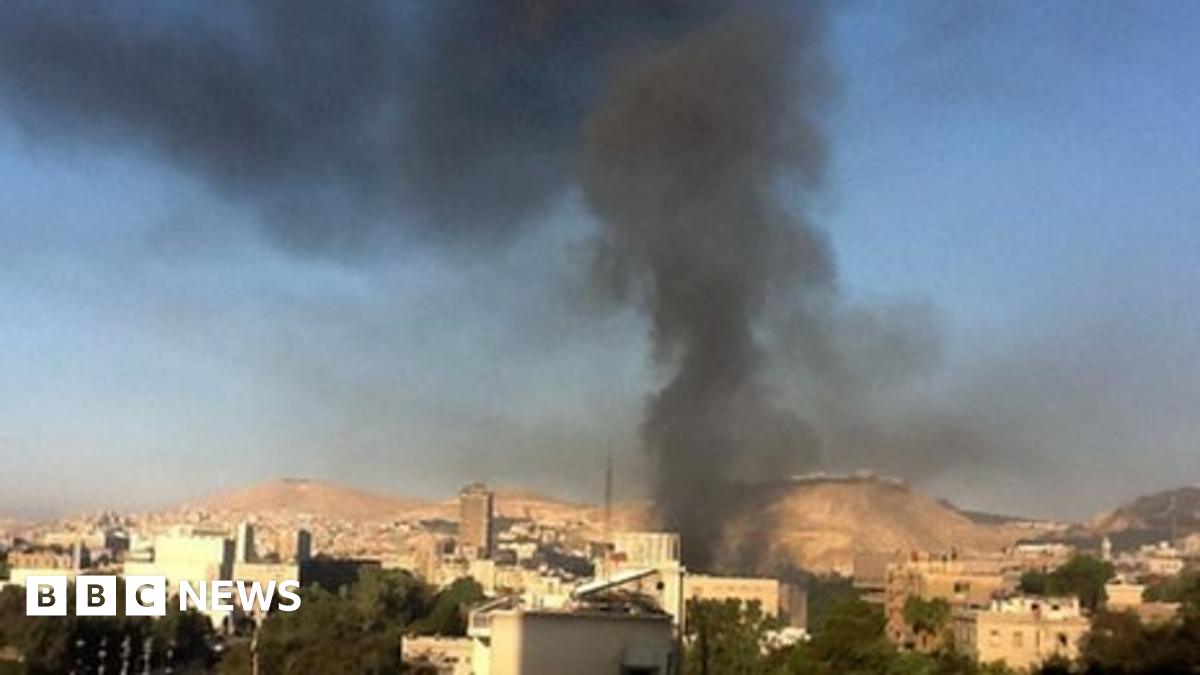Two large explosions have shaken the centre of Syria's capital Damascus, near the military general staff headquarters. The blasts happened just before 07:00 local time (04:00 GMT) in an area dominated by government buildings.
Information Minister Omran Zoabi said two roadside bombs caused the blasts, and said one might have been inside the main military compound.
Witnesses said the main building of the compound was on fire.
State media said only that fires had broken out near the military headquarters and while reports said there had been several injuries, officials said there had been no casualties in the attacks.
The BBC's Rafid Jabboori, in Damascus, says the apparent target and timing are very significant.
The staff command compound is the heart of the Syrian army and it is located in a strategic position in Damascus, near to the state TV building.
The main armed rebel group, the Free Syrian Army, announced a few days ago that it had moved its command inside Syria in an apparent attempt to raise its effort against the army's continuing crackdown on rebels, our correspondent says.
Witnesses in the city heard bursts of small arms fire coming from the area around the military HQ, and reports said a gun battle was raging between rebels and army personnel.
But Mr Zoabi sought to play down the attack, saying the explosions had caused only superficial damage.
State television described the blasts, close to one of the city's busiest areas at Umayyad Square, as a terrorist attack.
Our correspondent says roads leading to the area have been blocked.
He says security measures were stepped up around the military compound after a rebel attack last year killed several senior security officials, including the defence minister and President Bashar al-Assad's brother-in-law.
On Tuesday, anti-government rebels blew up a school building in Damascus that they said was being used for military training.
For much of the past 18 months, rebel groups have been fighting against Mr Assad's regime.
Thousands have died in the violence, which has erupted in cities across the country.
Repeated efforts by the international community to find a diplomatic solution have foundered because of a deep divide at the UN Security Council.
Information Minister Omran Zoabi said two roadside bombs caused the blasts, and said one might have been inside the main military compound.
Witnesses said the main building of the compound was on fire.
State media said only that fires had broken out near the military headquarters and while reports said there had been several injuries, officials said there had been no casualties in the attacks.
The BBC's Rafid Jabboori, in Damascus, says the apparent target and timing are very significant.
The staff command compound is the heart of the Syrian army and it is located in a strategic position in Damascus, near to the state TV building.
The main armed rebel group, the Free Syrian Army, announced a few days ago that it had moved its command inside Syria in an apparent attempt to raise its effort against the army's continuing crackdown on rebels, our correspondent says.
Witnesses in the city heard bursts of small arms fire coming from the area around the military HQ, and reports said a gun battle was raging between rebels and army personnel.
But Mr Zoabi sought to play down the attack, saying the explosions had caused only superficial damage.
State television described the blasts, close to one of the city's busiest areas at Umayyad Square, as a terrorist attack.
Our correspondent says roads leading to the area have been blocked.
He says security measures were stepped up around the military compound after a rebel attack last year killed several senior security officials, including the defence minister and President Bashar al-Assad's brother-in-law.
On Tuesday, anti-government rebels blew up a school building in Damascus that they said was being used for military training.
For much of the past 18 months, rebel groups have been fighting against Mr Assad's regime.
Thousands have died in the violence, which has erupted in cities across the country.
Repeated efforts by the international community to find a diplomatic solution have foundered because of a deep divide at the UN Security Council.




Comment